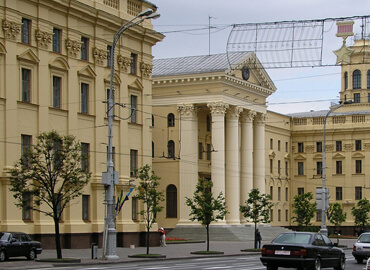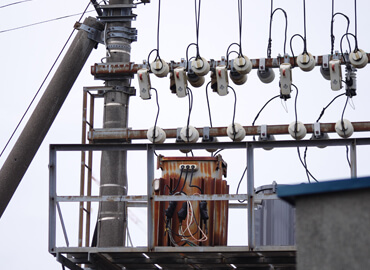INTRODUCTION
In this study, we analyze the actions of the Belarusian authorities to limit the access for their citizens to European education. We analyze specific steps of Lukashenka’s regime aimed at complicating the procedure of entering European universities for Belarusian citizens in 2020-2022 and especially in 2023-early 2024. We make an assumption that the consequences of such decisions will result in the re-orientation of Belarusian graduates towards entering Russian universities and in the outflow of the scientific and artistic elite from Belarus. We also propose a number of recommendations that would allow preserving the possibility of getting European education for Belarusian citizens in spite of significant obstacles on the part of the Lukashenka regime.
THE POLICY OF THE BELARUSIAN AUTHORITIES ON THE EDUCATION OF BELARUSIAN CITIZENS IN EUROPE BEFORE 2023
In the 2010s, one of the notable phenomena in Belarusian education was an increase in the number of school graduates who continue their education at European universities. Poland became the most attractive destination for Belarusian young people, where only in 2012-2018 the number of Belarusian students increased more than 3 times, and the number of such students was over 12 thousand people by 2023.
Another popular destination for Belarusian young people was Lithuania, where a university with Belarusian roots – EHU – has been operating since the mid-2000s. Despite the fact that EHU originally operated in Minsk and was closed at the initiative of the Belarusian authorities, the Lukashenka regime didn’t systematically persecute people who went to Lithuania to enter EHU. The Belarusian authorities had a rather neutral attitude towards those students who studied in Poland or other European countries.
In addition, centers for learning the Polish language began to open massively in Belarus, which, among other things, prepared school graduates for admission to universities in Poland, and some of such centers began to provide services for full support of the process of admission of graduates to some educational institutions in Poland.
Academic mobility programs involving the study and teaching of Belarusian citizens at European educational institutions were actively operating in Belarus. Only in 2015-2020, more than 2500 students and teachers from Belarus studied or taught in Europe within the framework of the Erasmus+ exchange programs. Finally, the Belarusian authorities publicly announced the possibility of opening an International Baccalaureate (IB) school in the country, the graduates of which are usually going to enter European and American universities.
The neutral policy of the Lukashenka regime towards citizens studying in Europe, as well as the development of educational cooperation between Belarus and Europe, led to the fact that European universities became the most demanded for Belarusian young people among all foreign educational institutions, including the traditionally leading Russian universities. Unlike the universities of the CIS countries, European universities could offer their students more modern educational programs and teaching methods, greater possibilities of mobility and exchange, and a wide range of academic freedoms. All these advantages of European education, as well as the possibility of integration into the international context, became the main motivation for Belarusian young people to choose the European educational vector.
The situation in Belarus began to change drastically after the 2020 protests. The Lukashenka regime considered the protests as “an attempt of the West to commit an armed rebellion and coup d’état in Belarus” and took a path to isolate Belarus from the European vector of cooperation in many areas, including education.
In August 2021, Aliaksandr Lukashenka made several statements, which indicate that the Belarusian authorities were preparing measures to limit the access of Belarusian citizens to European education. During a meeting with journalists, Lukashenka said the following: “We will take measures against those who went there (abroad) for education, brainwashing. I instructed the Minister of Education to make the toughest decisions. If we have started cleaning up, we will clean up everything. If you graduated from EHU, work in Lithuania. Work, we won’t care, it’s no big deal.” Lukashenka made a similar statement during the Republican Pedagogical Council: “They [Belarusian students] are not taught much there [in Europe]: they are far from our education. They are brainwashed abroad and brought to us as brainwashed agents. They are already ideological, if not enemies, then opponents of our state. And we must fight them.”
In the reality of Belarus’ political system, such statements by Lukashenka are a signal for action for the state bodies, which allows us to conclude that the campaign of the Lukashenka regime to limit the access of Belarusian citizens to European education started in summer 2021. The closure of the Goethe Institute and the German Academic Exchange Service in Belarus in the same period confirms this.
The campaign launched by the Lukashenka regime to restrict citizens’ access to European education continued in 2022. The Belarusian authorities made several decisions that complicated the procedure of citizens’ admission to foreign universities. First, such measures include a tenfold increase in the cost and creation of conditions for maximum complication of legalization (apostille) of documents. Second, the possibility of schools with international education programs for Belarusian citizens to operate in Belarus was actually destroyed. Compulsory secondary education was introduced for all citizens of Belarus, and after the introduction of the licensing procedure, schools with international programs of study (Innovation and Stembridge private schools) were liquidated. After all these actions, only one school with an international program remained in Belarus – QSI International School of Minsk, access to which is impossible for citizens of Belarus because of the necessity of compulsory education in schools with a national program of study. The situation with access of Belarusians to European education in this period of time was also complicated by the exclusion of Belarusian universities from the Bologna process and by the termination of cooperation between Belarusian and European educational institutions on mobility and exchange programs.
At the end of 2022, the Belarusian authorities decided to quit the intergovernmental agreement with Poland on mutual recognition of higher education documents and degrees in science and art. While all previous statements and decisions of the Belarusian authorities only complicated the procedure of entering and studying at European universities, the decision not to recognize Polish higher education documents directly affected thousands of people studying in Poland. Besides, this decision could have affected Belarusian school graduates and made them give up the idea of entering a Polish university. As the further review of the actions of the Belarusian authorities shows, this decision was the first in a series of further steps to systematically limit the access of Belarusian citizens to European education.
ACTIONS OF THE BELARUSIAN AUTHORITIES TO LIMIT ACCESS TO EUROPEAN EDUCATION IN 2023 — EARLY 2024
As noted above, at the end of 2022 the Belarusian authorities started to take actions that could significantly influence the decision of Belarusians to continue their education at European universities. After the 2020 protests, the Lukashenka regime is afraid of any manifestation of Belarusians’ uncontrolled political activity in every possible way. The restriction of access to European education for Belarusians is one of the elements of the process of toughening the political regime in Belarus and is intended to deprive Belarusians of the opportunity to see the action of real academic freedoms and mechanisms of life of a democratic and legal society. Throughout 2023 and at the beginning of 2024, the Belarusian authorities took several steps to make the procedure of admission of Belarusians to European universities as complicated as possible, to turn the fact of studying at such universities into an element of disloyalty to the Lukashenka regime with certain consequences.
A serious step towards limiting access of Belarusians to European education was the abolition of deferments from military service for citizens studying abroad. Starting from 2023, such deferment will be granted only to those students who receive education abroad at the request of Belarusian state bodies within the framework of the implementation of state programs. This decision directly affects a huge number of Belarusians and influences their decision to enter a European university. Any male citizen, if he is fit for service in the army, has to give up the idea of entering a foreign university, or he will face the fact that a criminal case for evasion of service in the army will be initiated against him on the territory of Belarus. In August 2023, the first precedent took place, when a criminal case was initiated in Brest region against a 23-year-old citizen of Belarus, who was a student of the Economics Faculty of Warsaw University of Life Sciences, for attempting to evade military service. In our opinion, the abolition of deferments from military service for citizens studying abroad will significantly reduce the number of Belarusian students at European universities and deprive a significant part of Belarusians of the opportunity to get a European education.
Throughout 2023, information about the actions of the Belarusian regime to develop pressure measures against citizens who decided to enter European universities frequently appeared in the informational field of Belarus. First, thanks to independent media, it became known about the facts of the authorities’ tracking of citizens who file documents for apostille. After receiving information about such cases, parents of graduates are summoned for preventive conversations, where they are advised to reconsider the decision to enter a foreign university. Second, the filing of documents by school graduates for apostille could be the reason for dismissal of some heads of educational institutions. Third, there are cases when school employees tried to find out whether students and their parents have ‘Pole cards’, which give certain privileges for admission and study at Polish universities. A significant role in the search for potential students of foreign universities was also played by the adoption of the updated Law “On citizenship of the Republic of Belarus”, which introduced the obligation for all citizens to inform the authorities about the possession of foreign documents (passport, residence permit, ‘Pole card’). The creation of a register of foreign document holders will allow the Lukashenka regime to purposefully intimidate their holders and threaten them with certain consequences in the form of repression. Besides, school employees, whose management will be personally responsible for the facts of graduates’ admission to foreign universities, can also work in this direction. All these facts indicate that those citizens of Belarus who decided to enter a foreign university, as well as their family members, will be under constant pressure from the authorities and, fearing the consequences, may give up their decision.
The work of the Belarusian authorities with the centers for learning the Polish language has been intensified. The Belarusian regime believes that such centers are a link between school graduates and Polish universities, and their liquidation can stop the flow of the Belarusian youth to Europe for higher education. This can explain the wave of crackdowns on such centers, which lasted throughout 2023. In March 2023, the Ministry of Information informed representatives of about 20 Polish language courses and organizations engaged in enrollment for study in Poland about blocking access to their websites. The justification for the blocking was the fact that the websites contained advertisements of study abroad, which hadn’t been approved by the Ministry of Education.
At the end of 2023, many centers for learning the Polish language were inspected by law enforcement agencies of Belarus. For example, as a result of such inspections, a well-known Polish language learning studio PanProfesor closed down. According to its management, the enforcers offered them to close down on their own, or the studio would be forcibly liquidated through the court. It is also known about a series of arrests of some managers and employees of such studios. According to the Polish media, at least 10 schools and Polish language courses were closed as a result of such inspections. In all cases, the enforcers demanded that they be provided with the personal data of students and the facts of possession of ‘Pole cards’. In our opinion, the authorities’ actions will result in a decrease in the number of students at Polish language centers. When such centers provide personal data of students to law enforcers, Belarusian citizens may fear greater attention from the authorities. Besides, there will be no intermediary organizations in Belarus that could connect Belarusian citizens directly with Polish universities. All this significantly complicates both the process of admission to universities in Poland and affects the decision of citizens to enter European universities in general.
The beginning of 2024 showed that the Belarusian authorities have no intention to stop the campaign to restrict citizens’ access to European education. In early January, in the program “Budet dopolneno” [To be added] of propagandist Ihar Tur, it was stated that EHU might soon be declared an extremist organization in Belarus. The propagandist said, “The recognition of EHU as an extremist organization in Belarus is a matter of time. After all, EHU has long ceased to be a university, but became just a destructive NGO. You, my dear, will still find yourselves at the point when the law appears. It doesn’t matter whether you like it or not. You will either violate it and be punished, or you will have time to take your documents and leave this EHU. And you have very little time left, it seems.”
The intention of the Belarusian authorities to continue fighting against young people entering European universities is demonstrated by the adoption of two documents – the updated Law “On advertising” and the Decree of Aliaksandr Lukashenka “On the concept of the state personnel policy of the Republic of Belarus”. According to the new version of the Law “On advertising”, advertising of work and study abroad is now allowed only on the Internet, on the websites of organizations and individual entrepreneurs, who are engaged in foreign employment and study abroad, and only with the approval of the Ministries of Education and Internal Affairs. In fact, this wording of the Law means that advertising of European education in Belarus is prohibited, as it will be extremely improbable to get approval for such advertising from the state authorities. As for the Decree of Aliaksandr Lukashenka, it describes mechanisms to regulate labor migration, and one of such mechanisms is “taking measures to prevent the outflow of personnel from the Republic of Belarus, primarily young people.”
All these facts clearly demonstrate that even in 2024 we should expect certain decisions of the Belarusian authorities to create all kinds of obstacles for Belarusians to enter European universities. The actions and statements of representatives of the Lukashenka regime are consistent and have the purpose to liquidate two most popular European directions for Belarusian graduates – universities of Poland and EHU. In case of liquidation of these directions, the number of Belarusians entering European universities will significantly decrease, and it will take a long time to build new popular directions. At the same time, the Belarusian authorities don’t introduce a complete legislative ban on the education in Europe, which gives the official propaganda an opportunity to claim “the openness of Belarus and the availability of all opportunities for young people to study abroad.”
The actions of the Lukashenka regime to restrict citizens’ access to European education are accompanied by unprecedented activity of Russia and China in the sphere of educational cooperation. In the last two months of 2023 only, Belarusian educational institutions signed dozens of cooperation agreements with Chinese and Russian universities. The Sputnik pro-Russian media outlet openly promotes the initiative to introduce deferments from the army for Belarusian citizens, who enter Russian universities, and advertises opportunities to study in Russia. In December only, Sputnik published articles about the peculiarities of admission of Belarusian young people to Russian universities, about the extension of the deadlines for acceptance of documents by Russian universities for Belarusians, about the procedure of admission to St. Petersburg universities based on the results of a literary contest, about the procedure of admission of Belarusians to the School of Design of the Higher School of Economics of Russia, about quotas at Russian universities for Belarus. The fact that the quota of 1300 places at Russian universities has been maintained despite the legislative initiatives of the Belarusian authorities demonstrates Russia’s big plans for students from Belarus.
As for China, in December 2023, the Main Education Departments of Vitsiebsk and Hrodna Regional Executive Committees placed advertisements about the possibility for citizens of Belarus to get education on exchange programs within the framework of the Belarusian-Chinese international treaty in the 2024/2025 academic year. The neutral and even favorable attitude of the Lukashenka regime towards cooperation with Russia and China in the field of education not only strengthens Belarus’ dependence on these countries, but also clearly confirms the fact that the restriction of access of Belarusian citizens to European education is motivated by political reasons.
In our opinion, the set of measures taken by the Belarusian authorities in 2023-2024, as well as the statements of representatives of the Lukashenka regime, will seriously affect the opportunities for Belarusians to receive European education. Crackdowns on Polish language learning centers, possible recognition of EHU as an extremist organization, pressure from the authorities on potential students of European universities, negative attitude of the authorities towards studying in European universities – all these facts will influence the decision of Belarusian young people about the place of further education. We see Russian universities as the biggest beneficiary in the current situation, as they can redirect the flow of doubtful students to themselves. Difficulties in entering European universities, increased attention and possibilities of repression from the state in case of entering such universities, absence of the language barrier and easy procedure of legalization in Russia, higher positions of some Russian universities in ratings of education quality compared to Belarusian ones – all these arguments indicate that we should expect an increase in the flow of Belarusians to Russian universities in 2024 and a decrease of this flow in the European educational direction. Such changes will result in the imposition of the Russian pro-governmental ideology on Belarusian citizens and the creation of a positive image of Russia in their minds, despite the waging of an aggressive war on the territory of Ukraine. Besides, it is very likely that the most talented representatives of the Belarusian youth will stay in Russia for work after graduating from Russian universities, taking into account incommensurable financial possibilities of Russian companies and organizations compared to Belarusian ones and a rather easy procedure of getting Russian citizenship for Belarusians. In our opinion, in the conditions of political struggle with European countries and total anti-European propaganda, the Lukashenka regime risks losing the potential elite of the country, which will either become a part of the Russian society or will be in extremely pro-Russian positions.
CONCLUSION AND RECOMMENDATIONS
As a result of our study, we have come to the following conclusions:
- The actions of the Belarusian authorities to limit citizens’ access to European education are caused by the 2020 protests and are politically motivated.
- The reason for this policy of the Belarusian authorities is the desire of the Lukashenka regime to limit the access of citizens to the understanding of mechanisms of the democratic and legal society and real academic freedoms as much as possible.
- The main goal of the Belarusian authorities’ policy is the elimination of the two most popular destinations for citizens to receive European education – Polish universities and EHU in Vilnius.
- The actions of the Lukashenka regime are consistent and aimed at achieving the set goals. At the same time, the Belarusian authorities don’t introduce a complete legislative ban on the education in Europe, which allows the official propaganda to claim “the openness of Belarus and the availability of all opportunities for young people to study abroad.”
- The main beneficiaries of the regime’s actions are Russian universities, which in the current situation have an opportunity to redirect the flow of the Belarusian youth to themselves.
- The consequence of the Belarusian authorities’ actions to limit the access of citizens to European education may be the outflow of the potential elite from Belarus and its complete orientation towards Russia.
In the current situation, we offer the following recommendations, which could allow to preserve the possibility of getting European education for Belarusians:
- Establishment and support of a single platform-aggregator, which would be oriented to Belarusian citizens and would include all possible options of study and procedures for admission to European universities.
- Establishment and support of certified online Polish language courses that would be allowed to issue documents recognized by Polish universities.
- Simplification of the admission procedure to European universities for Belarusian citizens, first of all, the abolition of the mandatory apostille of documents, a certificate from schools with the study plan and hours (currently, it is almost impossible to obtain these because of an unofficial ban).
- Expansion of existing scholarship programs and development of new ones for citizens of Belarus. Expansion of such programs for Lithuanian universities, given the possible recognition of EHU as an extremist organization by the Belarusian authorities.
- Creation of special summer schools or short-term educational programs at European universities for Belarusians who are already studying at universities in Belarus or Russia.
- Expansion of quotas at schools with international educational programs for citizens of Belarus (UWC Belarus and similar), especially for residents of small regions.
- Visa support for applicants, students and teachers wishing to study outside Belarus.











